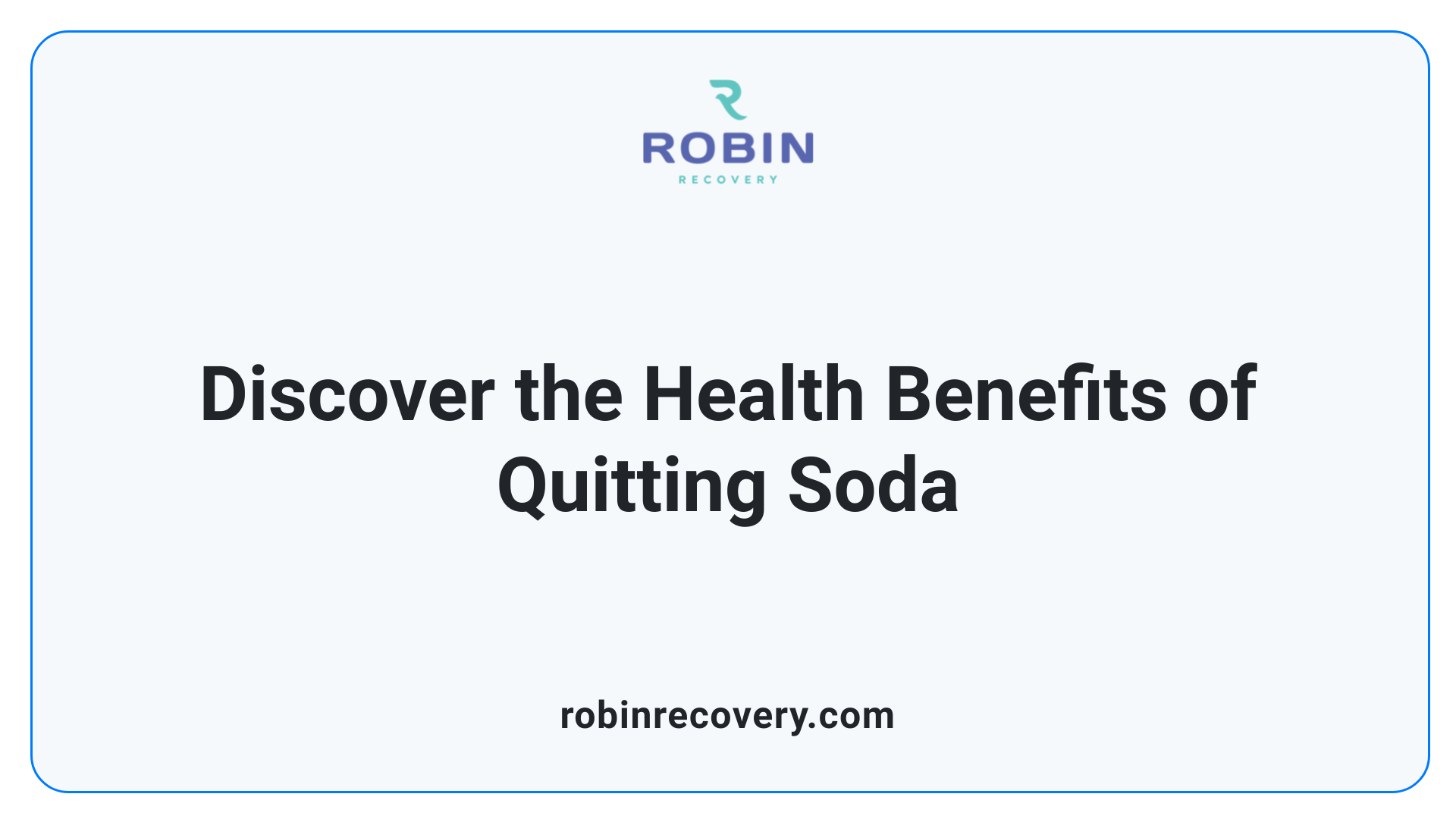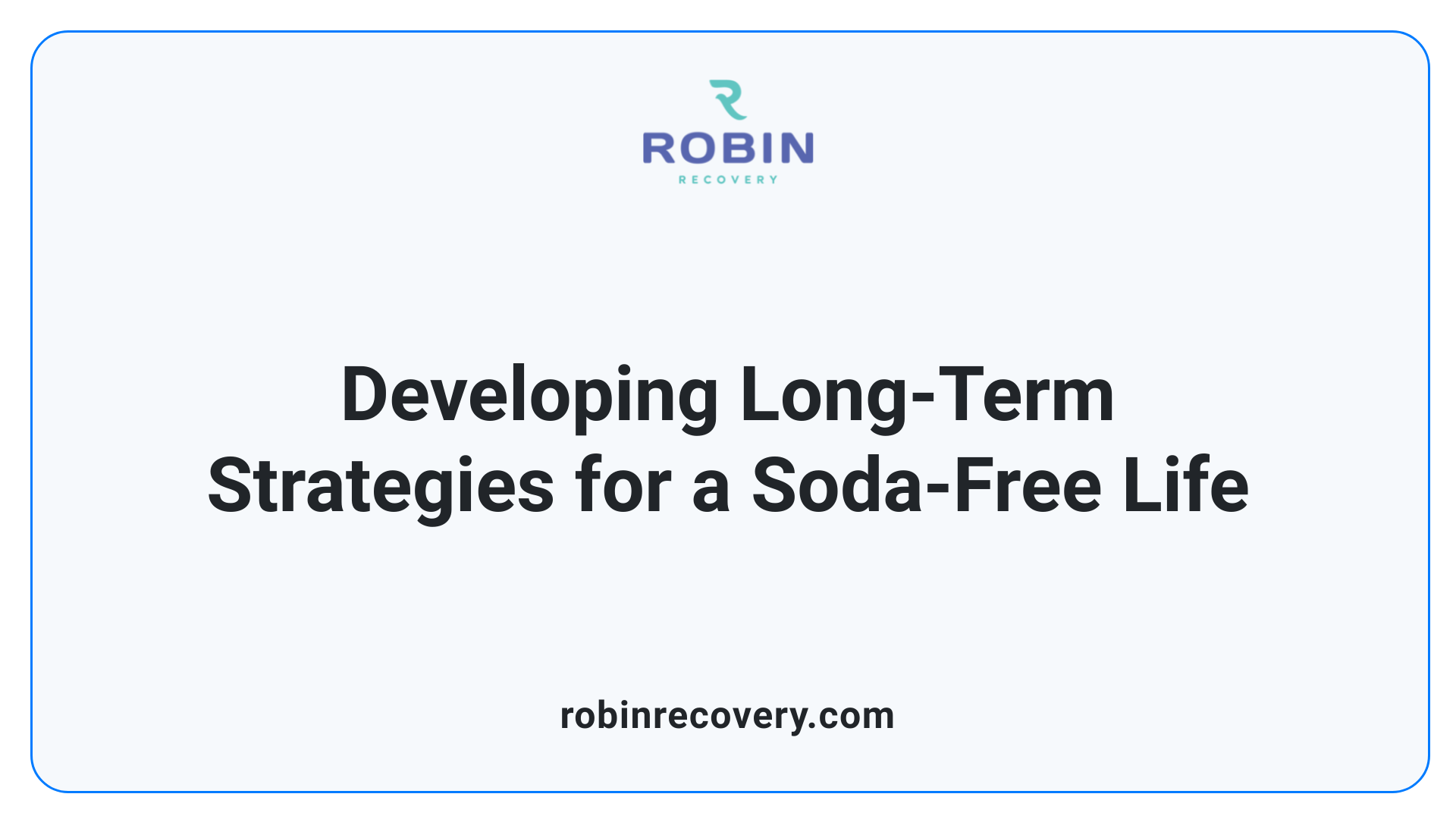How to Stop a Soda Addiction

Understanding Soda Addiction and Its Impact
Soda addiction is more common than you might think, rooted in a combination of chemical stimulation, habitual behaviors, and social influences. Many people struggle to quit due to the addictive nature of caffeine and sugar, which drive cravings and dependency. However, overcoming this addiction is crucial for improving both short-term and long-term health. This guide explores the reasons behind soda addiction, health effects, and provides practical strategies to break free from its grip.
The Science Behind Soda Addiction

Addictive Components in Soda
Soda's addictive nature primarily stems from its high sugar and caffeine content. Sugar is known to trigger the brain's pleasure centers by releasing dopamine, reinforcing cravings and creating a cycle of dependency. Meanwhile, caffeine acts as a stimulant, enhancing mood and alertness but also leading to withdrawal symptoms like headaches and irritability when consumption ceases. This combination makes breaking away from soda challenging, as the body becomes reliant on these substances for a quick boost.
Psychological and Physical Dependence
The dependency created by soda is both psychological and physical. Many individuals develop emotional associations with soda – using it as a reward, comfort, or a social beverage in gatherings. This psychological dependence can make it difficult to replace soda with healthier options. Physically, regular consumption may lead to adverse health effects such as weight gain and increased risk of chronic conditions, creating a feedback loop that justifies continued use despite potential harms.
Why Is Soda So Hard to Quit?
Soda is difficult to quit for several reasons. One significant factor is caffeine; if you're accustomed to caffeinated sodas, withdrawal can lead to symptoms like fatigue and irritability. Additionally, the sugar content in many sodas can create cravings, as sugar stimulates the brain's reward system, making you feel good temporarily. This can lead to a cycle of dependency where you feel the need to consume soda to maintain those pleasurable feelings. Moreover, the habit of drinking soda often becomes ingrained in daily routines or social settings, making it challenging to break away from the routine.
Health Benefits of Quitting Soda

Immediate and Long-Term Health Benefits
Quitting soda initiates a transformative journey for your health. In the first few days, you might experience withdrawal symptoms such as irritability and cravings, particularly if you’re used to caffeine. By the third day, many report a noticeable increase in energy levels and improved sleep patterns.
As you continue to abstain from soda, additional benefits unfold. Individuals often enjoy clearer skin, better digestion, improved mood, and enhanced joint health within the first week. Over time, eliminating soda leads to significantly reduced risks of chronic diseases such as heart disease, type 2 diabetes, and various dental problems. This is largely due to a marked decline in sugar and calorie intake, which otherwise contributes to various health complications.
Improvement in Hydration and Overall Well-being
The shift from soda to healthier beverages, like water and herbal teas, dramatically improves hydration. Sodas, laden with caffeine and sugar, can dehydrate the body, leading to increased thirst and cravings. Increasing water intake helps mitigate these cravings while promoting overall well-being. Sustained hydration not only supports optimal bodily functions but also helps maintain energy levels and mood stability.
In summary, overcoming a soda habit paves the way for numerous health benefits that enhance both physical condition and mental health. This positive change fosters a robust lifestyle free from the adverse effects of high-sugar beverages, positioning you for long-term well-being.
Navigating Soda Cravings and Withdrawal Symptoms

Dealing with withdrawal symptoms
Quitting soda can result in withdrawal symptoms, especially for those accustomed to high caffeine intake. Common symptoms include severe headaches, irritability, and fatigue. To ease these effects, a gradual reduction in soda consumption is recommended. Start by decreasing the amount you drink daily—perhaps replacing one soda with water or a flavorful alternative.
Choosing to mix soda with sparkling water can help blend flavors while reducing both sugar and caffeine intake. Additionally, maintaining hydration is essential; drinking plenty of water can mitigate some withdrawal symptoms and keep cravings at bay.
Managing cravings effectively
Cravings are a significant hurdle when reducing soda intake. To combat this, identify triggers—be they emotional, social, or habitual—and plan healthier, satisfying alternatives. Options such as flavored seltzer or herbal teas can provide the fizz or taste that some miss without the detrimental effects of sugar and acid.
Practicing mindfulness is also beneficial; taking a moment to consider what you enjoy about soda can help you find substitutes that meet those desires. Setting clear, achievable goals—such as gradually replacing sodas—can empower you and measure progress. Celebrate small wins to maintain motivation in your journey towards healthier habits.
Understanding and Managing Withdrawal
How long does withdrawal from soda last?
Withdrawal from soda can be challenging, especially for those dependent on caffeine. The process typically begins 12 to 24 hours after stopping soda intake. The duration and intensity of withdrawal symptoms vary by individual but generally last from 2 to 9 days. Common symptoms include:
- Headaches
- Fatigue
- Anxiety
- Irritability
- Difficulty concentrating
- Depressed mood
The intensity of these symptoms often peaks 20 to 51 hours after stopping caffeine consumption. Individuals may find that symptoms decrease in severity as the days progress.
Coping strategies for symptoms
To ease the withdrawal process, consider adopting these strategies:
- Gradually reduce intake: Cutting back slowly can minimize withdrawal symptoms.
- Stay hydrated: Drinking plenty of water helps to reduce headaches and fatigue.
- Engage in physical activities: Regular exercise can boost your mood and energy levels.
- Mindful eating: Nutrition can affect mood, so maintain a balanced diet to support overall well-being.
- Support system: Share your goals with friends or family for accountability and motivation.
Understanding and preparing for withdrawal can significantly ease the transition away from soda consumption.
Practical Steps to Quit Soda
Setting Achievable Goals
Quitting soda can present challenges, especially if you’ve been accustomed to it for years. Setting realistic goals is crucial. For many, it’s advisable to start small by gradually reducing consumption. For example, if you currently enjoy a can of soda each day, aim to cut back to one can every other day. Gradually increasing the portion of water mixed with soda or replacing it with healthier options can ease the transition.
Mindfulness plays a key role in this process. Reflect on what you enjoy about soda—whether it's the flavor, the fizz, or the caffeine boost—and look for healthier alternatives that can satisfy those cravings. Engaging in other activities, such as going for a walk or drinking herbal tea, can also serve as distractions.
Alternatives to Soda
Finding appealing substitutes is essential when reducing soda intake. Explore options such as:
Alternative Benefits Flavor Variants Sparkling Water Zero calories, helps satisfy fizz cravings Fruit-flavored or plain Herbal Tea Hydrating, caffeine-free Variety of flavors; hot or iced Kombucha Probiotic benefits, lower in sugar Many flavors; slightly tangy Infused Water Refreshing, customizable Add fruits or herbs for flavor
Keeping water easily accessible throughout the day is important. Consider a water bottle that you carry with you or set reminders to drink water regularly. Being prepared with healthier options ensures that when cravings hit, you're ready with alternatives that don't compromise your health.
Creating a Supportive Environment

Building a support system
Creating a supportive environment is crucial when attempting to quit soda. Informing friends and family about your goal can help establish accountability. They can offer encouragement and understanding, particularly during cravings or difficult moments. A supportive network can motivate you to stay on track and share healthier alternatives or strategies that worked for them.
Additionally, joining a community group focused on healthy habits can provide you with shared experiences, tips, and motivation. Whether it’s an online forum or a local fitness club, connecting with others who share similar goals can significantly ease the journey.
Replacing habits with healthier options
Another strategy is to replace the habit of drinking soda with healthier options. For instance, consider keeping flavored sparkly water or herbal teas accessible, providing the fizz and flavor you might miss from soda without the downsides of sugar and caffeine. You could also explore making infused water with fruits or herbs, enhancing its appeal.
By deliberately incorporating healthier beverage options, you can curb soda cravings and support your health goals more effectively. Engage in activities that distract from the urge for soda, like going for walks or enjoying a nutritious snack, to create new rewarding habits that align with a healthier lifestyle.
Long-term Strategies for a Soda-Free Lifestyle

Developing New Habits
To maintain a soda-free lifestyle, it’s crucial to develop new, healthier habits. Begin by replacing soda with alternatives that satisfy similar cravings. For instance, flavored sparkling water or herbal tea can provide refreshment without the sugar and acidity that harm your health. You might also want to keep fresh fruits or herbs on hand to enhance the taste of water, making hydration more appealing.
Moreover, staying hydrated throughout the day can significantly reduce soda cravings. By consistently monitoring your fluid intake, you’ll cultivate a preference for water over sugary beverages.
Mindful Consumption Practices
Engaging in mindful consumption practices plays a vital role in overcoming soda dependency. Take time to identify scenarios where cravings arise, such as during social events or as comfort snacks. Developing strategies to avoid these triggers, or planning healthier alternatives, ensures you stay prepared.
Practicing mindfulness can also involve enjoying food and drinks in a more intentional manner. This can lead to greater satisfaction and lessen the desire to return to soda. Introduce enjoyable activities during times of cravings, like going for a short walk or brushing your teeth, to distract and redirect your focus.
Adopting these long-term strategies can significantly support lasting changes in your beverage choices.
Embrace a Healthier Life Without Soda
Breaking a soda addiction is not only about what you remove from your diet, but also what you add—better hydration, healthier habits, and a mindful approach to what you consume. The journey may present challenges, but with the right strategies and support, it is entirely achievable. You will reap the rewards of better health, more energy, and a renewed sense of control over your life. Start today, and take those first steps towards a soda-free life.
References
- How to Kick Your Soda Habit? | Blog | Community Health
- Making Healthier Choices: A Guide to Quitting Soda - Banner Health
- Soda Addiction: Symptoms, Effects, and How to Quit - Healthline
- Quitting Soda and Switching to Water
- How to Stop Drinking Soda - Saber Healthcare Group
- How your body changes when you stop drinking soda - Geisinger
- Soda Addiction: Definition, Symptoms, Causes, and Treatment
- Can you be addicted to soda? | Ohio State Medical Center
